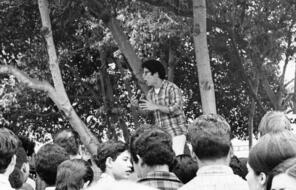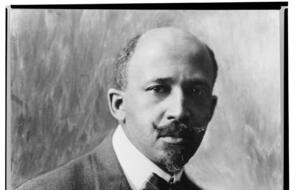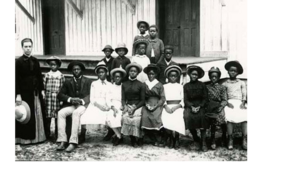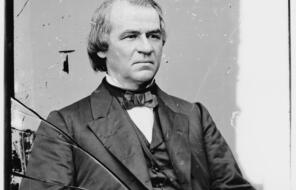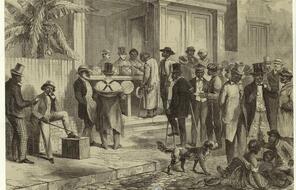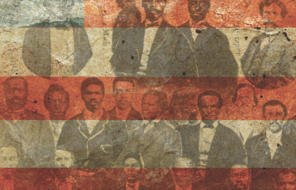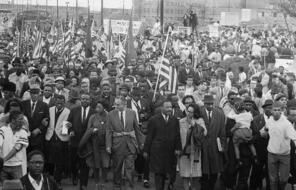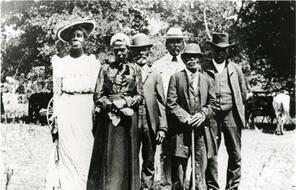Speech by Senator Charles Hays Reaffirming the Rights of African Americans (1874)
At a Glance
Language
English — USSubject
- History
- Democracy & Civic Engagement
- Racism
In 1874, Congress was debating a new civil rights bill that would end segregation of public transportation and public accommodations (such as hotels). Charles Hays of Alabama, a former slaveholder turned Republican congressman, supported the bill despite growing opposition, threats, and violence in his state. He addressed Congress as follows:
I am aware, sir, that the hate of the ignorant and the scorn of the untutored will be invoked against me. All these things are sources of profound regret; but they shall not deter me from the faithful discharge and sacred observance of a duty which God, reason, and conscience tell me is right.
Coming from the far South, being once the owner of a large number of slaves, thoroughly conversant with their history in the past and present, I feel that I have some idea of what should be accorded them now. Set free by the strong arm of Federal power, cut adrift upon the cold charities of an inhuman world in ignorance and penury that they did not bring upon themselves, struggling against adverse winds and storms of hate, in my opinion, sir, the colored race have set an example that fairly entitles them to the plaudit of “Well done, ye good and faithful servants.”
The discussion of this question of “civil rights” has brought about a state of feeling in the South which is to be deplored. Fancies have taken the place of facts. Imagination has been called upon to paint pictures which reality could not do. Newspapers, politicians, demagogues, and inciters of sectional hate preached to the white masses of the south that Congress was upon the verge of enacting a law enforcing “social equality” and blotting out the lines between knowledge and ignorance. You and I know better . . .
The appeal is made that such an undying antipathy exists between the races as will render this law dangerous to be passed. I believe no such twaddle. Thousands of the most intelligent men of the South were born and raised upon the old plantations. Childhood’s earlier days were passed listening to the lullaby song of the Negro nurse, and budding manhood found them surrounded by slave association. Was there prejudice then? Was cry against “social equality” raised then? Never, sir; but now that they are free and receiving the enlightenment of education, for the first time the fact is discovered that the Negro, who molded our fortunes, built our railroads, erected our palatial mansions, and toiled for our bread, is a curse upon the face of the earth, and not entitled to the protection of society.
Sir, for one, as a Southern man, I feel a debt of gratitude to them. I remember that when the tocsin of war called Southern men to the field of battle; when our whole country, from Virginia to Texas, was populated by none other than women and children, and when “insurrection” and “revolt” could have butchered those that were near and dear to us, the poor Negro toiled on and toiled well; protected our defenseless homes, and fed our destitute widows and starving children. In that hour of bondage and slavery they proved true to me and mine, and now that it lies in my power to pay the debt, the instincts of honor tell me to do it willingly and cheerfully, “as best becomes a man.”
No possible harm can come to the white man by the passage of this law. Get upon the cars tomorrow morning and start South; take your seat in the finest palace car, and you will find southern women traveling and sitting side-by-side with colored women as nurses and servants. Is objection raised to this? Not at all. Does anyone feel debased by the Negro there? Not at all. Why then should the case be changed when the Negro buys a first-class ticket and travels alone? Have not Southern men associated with them for ages? Has any great conflict arisen heretofore? If “social equality” has been practiced it has been voluntary.
Sir, this talk about “social equality” will not bear the scrutiny of reason and common sense. It is the cry of the oldest time office-holder and cod-fish aristocrat, who uses the Negro now as he once did the poor white man—to make capital of. Who brought about the state of affairs? When the 13th Amendment was offered to the South was it accepted? No, sir; the very men who today are deluding the people by the specious cry of “social equality” caused the South to reject that proposition. Andrew Johnson and his providential provisional governors dictated the policy of the South. That move failed. Then came the 14th Amendment, and, last of all, the 15th Amendment. If, then, anyone is responsible for the present state of affairs it is the southern democracy [Democratic Party] themselves, who would not listen to reason, but rushed blindly on in the wanted paths of prejudice and hate.
This new issue is upon us and must be met. There is no ground for retreat. The past is gone, and the present is upon us. True-hearted patriots cannot swerve from the past, but, guided by the logic of events, must cheerfully accord to our colored fellow citizens every right that belongs to a “freeman, and every privilege that is guaranteed them by the Constitution of the country. “The world moves;” and a vindication of our course will come as sure as the waters flow or the stars shine. 1
- 1 In Glenn M. Linden, Voices from the Reconstruction Years, 1865–1877 (Harcourt Brace/Cengage 1998), 241–242.
How to Cite This Reading
Facing History & Ourselves, "Speech by Senator Charles Hays Reaffirming the Rights of African Americans (1874)," last updated March 14, 2016.
This reading contains text not authored by Facing History & Ourselves. See footnotes for source information.

